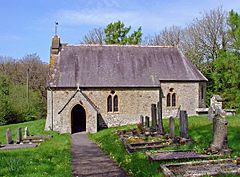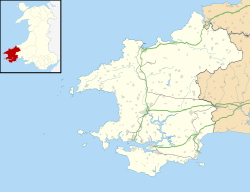Church of St Dogfael, Meline facts for kids
Quick facts for kids St Dogfael's Church, Meline |
|
|---|---|
| Church of St Dogfael, Meline | |

"An object lesson in High Victorian geometry"
|
|
| 52°00′55″N 4°44′38″W / 52.0152°N 4.7439°W | |
| Location | Meline, Pembrokeshire |
| Country | Wales |
| Denomination | Church in Wales |
| History | |
| Status | Redundant |
| Founded | 1864–1865 |
| Dedication | Saint Dogfael |
| Architecture | |
| Heritage designation | Grade II |
| Designated | 10 December 1997 |
| Architectural type | Church |
| Specifications | |
| Materials | Stone, slate roof |
The Church of St Dogfael in Meline, Pembrokeshire, Wales, is an old church built in the 1800s. It's a special building because it's a Grade II listed building, which means it's important and protected. This church is now looked after by a group called the Friends of Friendless Churches. A "redundant church" is one that is no longer used for regular church services.
Contents
History of the Church
The Church of St Dogfael is named after St Dogfael. It was built between 1864 and 1865. The person who designed the church was an architect named Robert Jewell Withers. The main supporter, or "patron," who helped pay for it was Sir Thomas Lloyd.
Sir Thomas Lloyd's Projects
Sir Thomas Lloyd was a wealthy landowner and a Member of Parliament for Cardiganshire. He believed his family came from the ancient Lords of Cemaes. Sir Thomas spent a lot of his money building and restoring several buildings on his land. He liked a style of building called Gothic Revival, which looked like old medieval castles and churches.
Some of the buildings he worked on included his own home, Bronwydd Castle, a court house in Felindre Farchog, and the restoration of the old Newport Castle. The small Church of St Dogfael was also one of his projects.
Church Design and Features
The Church of St Dogfael is described as small and simple. Experts have called it a great example of "High Victorian geometry," meaning it has clear, simple shapes and not too many extra decorations.
Building Materials
The church is built using sandstone, which is a type of rock. It also has special details made from Bath stone, and its roof is covered with slate.
Old Foundations
The church was built on the same spot where an even older church once stood. There's a doorway on the north side of the church that might be from the original, much older building. It could be a genuine Norman piece, which means it's from the time of the Normans (around 1066 and later), or it might be from a later medieval period.
Protecting the Church
Because it's a Grade II listed building, the Church of St Dogfael is recognized as an important historical building. Since it is no longer used for regular services, it is now cared for by the Friends of Friendless Churches. This charity helps to look after old churches that are no longer in use, making sure they are preserved for the future.
 | Emma Amos |
 | Edward Mitchell Bannister |
 | Larry D. Alexander |
 | Ernie Barnes |


